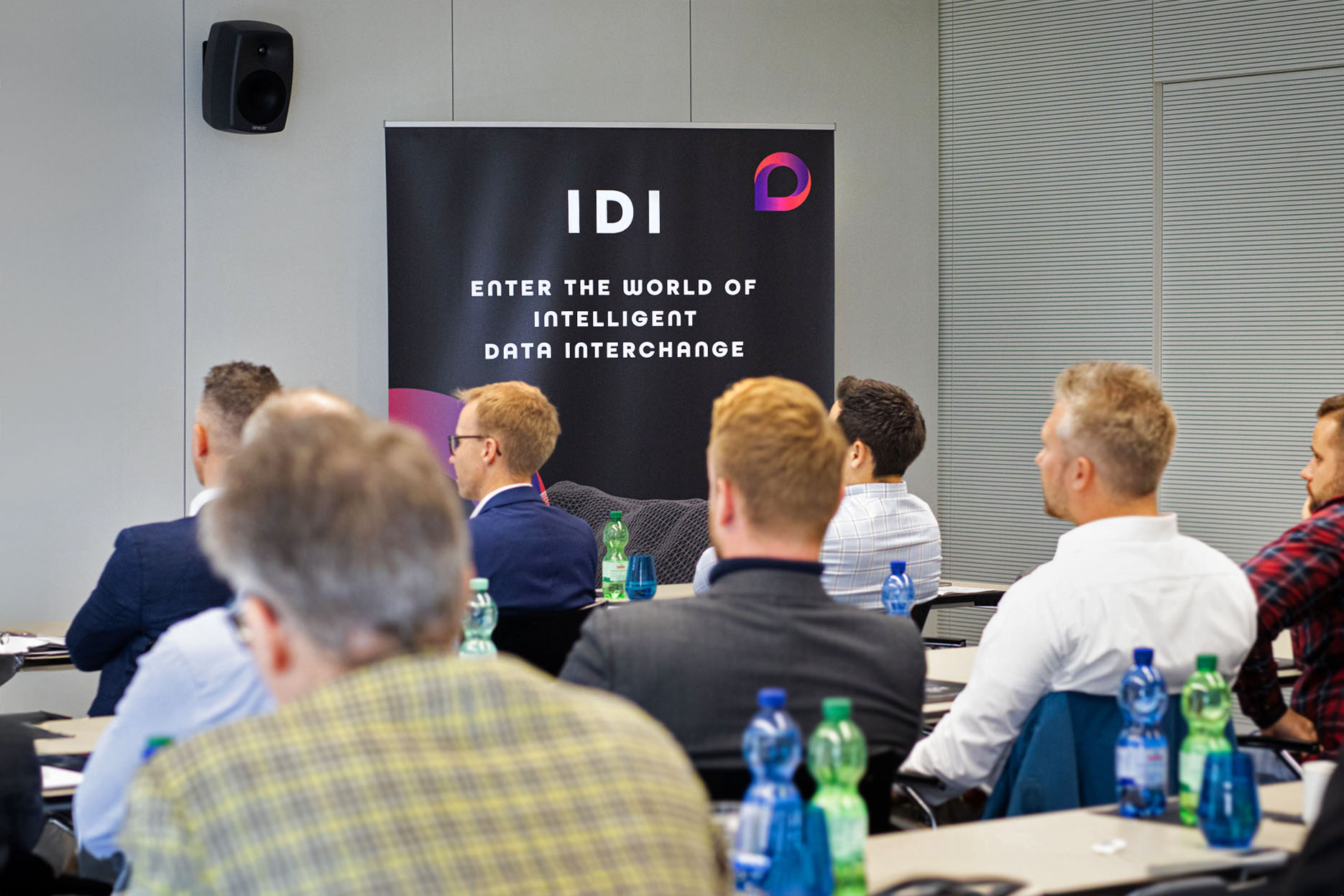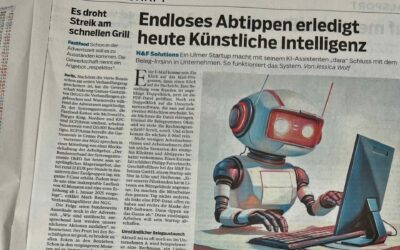Kickoff into a new era of Intelligent Data Transfer at the IDI Conference 2023

“WE DON’T NEED MORE DISCUSSIONS ON EDI TOPICS; THERE’S ALREADY PLENTY, AND THERE’S BEEN NO PROGRESS FOR YEARS.”
With these words, Tobias Hertfelder, CEO of H&F Solutions welcomed participants to the IDI Conference on October 19, 2023, at the Heilbronn Educational Campus. His quote harks back to the 2020 VDMA exchange on Electronic Data Interchange. Past pessimism has led the software start-up to elevate document exchange to the next level, introducing Artificial Intelligence (AI). He elaborates: “Today, we’re talking about IDI – Intelligent Data Interchange. True to the spirit of the Bay Area in the USA, I follow the approach: Just do it.” Only 5 % of the document exchange market regarding EDI solutions is automated, indicating immense potential. Support from loyal partner companies and a prominent Baden-Württemberg Family Office across multiple financing rounds generates the necessary drive to create the best solution for the stagnating EDI market, prioritizing effectiveness over speed or short-term profitability. “We take time with our pilot customers, yet we’re racing against time. There’s no one to imitate or learn from. We are absolute first movers, and that’s a good thing,” describes Tobias Hertfelder. Therefore, through the conference, he aims to establish an open and transparent platform, fostering the first community dedicated to intelligent data networking. For this reason, he invites experts from research, science, and industry to promote a vibrant exchange of ideas.




DATA – A VALUABLE RESOURCE
Impressively, Prof. Dr. Dr.-Ing. Dr. h.c. Jivka Ovtcharova, Head of the Institute for Information Management in Engineering at the Karlsruher Institute of Technology (KIT) and Director at the Research Center for Information Technology Karlsruhe (FZI), takes the floor. Drawing on decades of experience in corporations, working with SAP, and extensive research, she states that “Open Innovation” serves as a modern license for growth in a digital world. Ovtcharova explains, “In the age of Industry 4.0, cyberization, linking human and machine intelligence, is increasingly crucial. Transformation in this direction, and therefore value creation, is only possible through intangible assets, namely data.” This most valuable resource for any company simultaneously presents a challenge for intelligent data management. Artificial Intelligence (AI), according to Statista, is the fastest-growing economic trend. Ovtcharova emphasizes, “Technology alone cannot change the world; it needs to be applied by people. This requires greater data understanding, business models, and qualifications in Germany. The introduction of Hybrid Intelligence (HI) such as ChatGPT sets an example.” By following the approach of Open Innovation, partnering with others to build new business processes, and finding a profitable solution for all, Ovtcharova elaborates on the importance of data sharing. This can lead to the creation of digital ecosystems and value through Intelligent Data Interchange.


Philipp Futterknecht, CTO of H&F Solutions, reinforces this call and also emphasizes that automation of EDI processes must be done by machines in the future, not by the limited resource of humans. Scalability and economic growth are only possible in this way.
Uwe Zurth, Head of Customer Benefits at SEW-Eurodrive GmbH & Co. KG, explains how a customer of a technology provider envisions the implementation of such innovation projects. “From my perspective, the potential for intelligent EDI approaches is enormous, especially considering that nothing has changed in this market for 30 years. It’s time for the next level.”
While he aims to keep the barriers low for starting an IDI project, making the onboarding process as simple as possible, Benjamin Schneider, Department Head of IT B2B Solutions/Business Integration at logistics company Dachser SE, emphasizes the need for democratization, allowing certain data integration services to be conducted by external firms. This democratization could involve local experts at Dachser who are not in IT or intelligent solutions using AI. “Data integration is the lifeblood of logistics for us because we are a cyber-socio-physical enterprise.” Despite managing the complexity of various EDI solutions in use, he cannot accept any restriction. Dachser is actively seeking ways to intelligently scale and is enthusiastic about being a first-mover in the IDI community.
Looking into the near future, Klaus Indefrey, Head of a technical unit for implementing “Industry 4.0” at Siemens, predicts that the importance of data will soon become tangible in every company. For instance, starting in 2026, it will be legally required to disclose supply chain transparency for battery modules exceeding 2kWh. The current lack of standards is a problem, as he demonstrates in various scenarios from internal business contexts. Siemens takes a leading role due to direct customer contact, confronting concrete challenges such as the need for a highly decentralized data capture, as in this case.
Daniel Willinger, Sales EDI Coordinator for DACH at FESTO, provides insights into the pilot solution with Intelligent Data Interchange. With over 1,600 EDI connectivity projects and approximately 60 new clients connected using conventional methods, he assesses the success of H&F Software: “At the project’s start with H&F Solutions, we were open to the results, albeit somewhat skeptical. However, the application delivered on its promises, unexpectedly surpassing the know-how of our in-house staff.” He still finds challenges with customer-specific material structures and part lists.





PANEL DISCUSSION
During an open panel discussion with the day’s top speakers, Uwe Zurth touches upon this, explaining the paradigm shift. For successful digitization, well-structured data is crucial within a company: “I once believed that our primary task before actual digitization was cleaning up and structuring existing data. However, new AI and NLP (Natural Language Processing) approaches have called this into question. We need to examine how these time-consuming activities might be reduced or replaced by these new technologies.” Mark Kumbruch, Head of IT Business Services Customer Management at ifm, agrees:
„Despite global e-commerce platforms, we lack sufficient means, with today’s tools (traditional EDI), to grow substantially toward customers in digitization. That’s why I’m grateful to have discovered H&F’s AI solutions and the IDI community at the right time.“


EVEN WITH THE FOCUS ON DATA, THE HUMAN ELEMENT AS USERS OF TECHNOLOGY SHOULDN’T BE OVERLOOKED.
The sentiment agreed upon was to include people in this transformation, as self-learning or autonomous systems often cause fear of job replacement. Creating meaningful work for future generations is essential to avoid lagging behind other faster-transforming countries.
Comparatively, Matthias Hohensee, US-correspondent of WirtschaftsWoche, connected via video from Silicon Valley, confirms the promising reputation of German tech companies in the US. He highlights the recent tech upswing post “Tech Depression” and emphasizes the importance of private investments to compete internationally, especially given that only 15 % of German companies are using AI, as per Bitkom’s survey. Hohensee shares, “Data is the new oil,” expressing his observation that the Heilbronn AI scene is on the right path, showcasing the potential to compete globally.
Tobias Hertfelder concludes, “That’s why we feel so comfortable in Heilbronn. We fit right in and will collectively shape the AI world with our paradigm shift towards IDI, Intelligent Data Interchange.”


#IDI #IntelligentDataInterchange #EDI #nextlevelEDI


